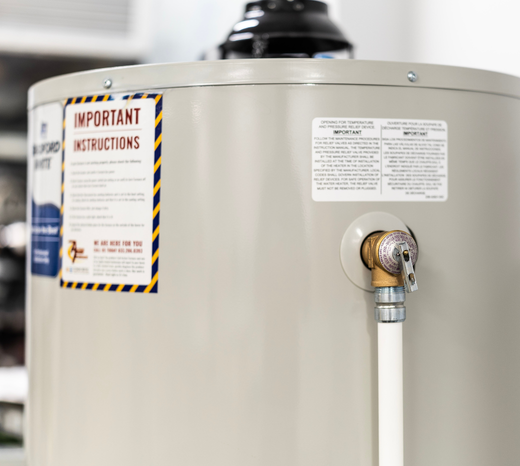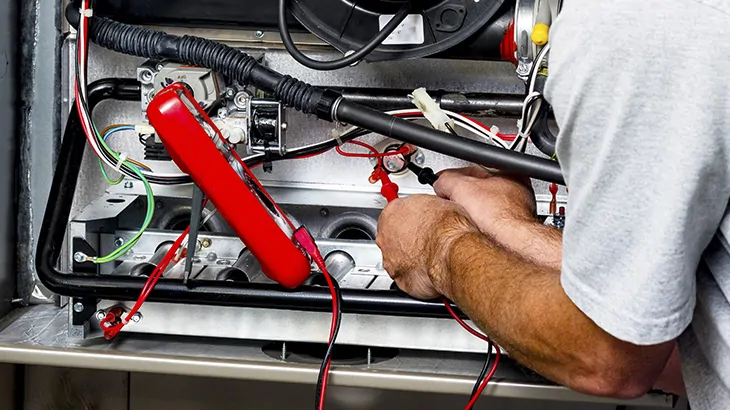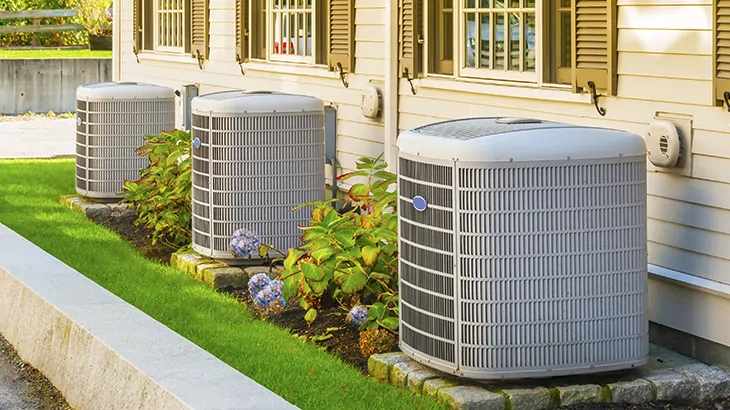Education Centre, Hot Water Heaters
Wondering how your water heater works to give you showers? We’ll outline how it keeps your home supplied with plenty of on-demand hot water.
...

Your homes hot water heater is essential to both its functionality and comfort. If your hot water heater goes, it can cause a lot of headaches – cold showers and an unusable dishwasher could be the least of your problems.
As such, it’s important to have a general idea of how your homes water heater works. Knowing the basics could save you and your family a lot of stress, so we’ve compiled a brief guide to help you.
 The Basics of Hot Water Heaters
The Basics of Hot Water Heaters
Whether you refer to it as the water heater, the hot water tank, or something in between, the functionality and purpose of this appliance are all the same. The hot water heater is the machine responsible for converting energy into heat and subsequently creating hot water for use throughout your home.
There are a variety of different systems when it comes to hot water heaters, but most residential units can be “boiled down” into two categories:
 Tank-Type Hot Water Heaters
Tank-Type Hot Water Heaters
The more common tank-type of hot water heater includes – you guessed it – a tank, for holding hot water. While this kind of unit is frequently found in older homes, it is slowly losing popularity due to its inefficiency. This kind of hot water heater holds heated water in supply until it is needed throughout the home.
How They Work
Hot water heaters with tanks can run on fuel or electricity, and generally have 3 pipes for water transfer: one to bring cold water in, one to move hot water out, and a safety valve that releases water from the tank if the pressure or temperature exceeds safety limits.
The cold water pipe brings water to be heated into the bottom of the tank where the heating elements are located. As the water warms, it rises to the top of the tank to be removed on demand by the hot water pipe.
If hot water is not being used, it sits in the tank, being continually heated. If the hot water is used up, there can be a delay and you may need to wait for the tank to fill again.
For more detailed information on the basics of tank-type hot water heaters, check out our infographic below:

 Tankless Hot Water Heaters
Tankless Hot Water Heaters
Tankless hot water heaters are growing in popularity due to their increased energy efficiency. These kinds of units heat water on demand, rather than continually running to keep water hot. However, the downside is that they can be a bit lower in flow rate, particularly if they do not have a small storage tank attached. These storage tanks are used to increase the rate of flow while hot water is already in use rather than holding it.
How They Work
Tankless hot water heaters work by using a coil to heat cold water as required. There are generally two types of tankless hot water heaters: boiler-mounted and standalone.
Boiler mounted hot water heaters rely on your boiler to generate heat, whereas standalone hot water heaters typically use a gas-fired unit with a coil and heat exchanger.
Leaks
If you discover your hot water tank is leaking, before calling in for repair, check that any valves or water exchange pipes do not simply need to be turned or tightened. If one of the pipes has a small hole, this could be easily repaired using sautering or other means.
If you know that it is indeed your hot water tank that is leaking, it will probably need to be replaced. Corrosion could be the culprit and may be temporarily slowed down with a patch, but ultimately, will continue.
Temperature Issues
If there is no hot water: first, check your breaker. Is there a fuse blown that could be preventing your heater from functioning? Be sure to figure out why the breaker was tripped, or else the problem could compound. Check to see if your thermostat was affected, too.
If your electrical breakers and thermostat are fine, it could be that your heating element has failed and will need to be replaced.
If there is not enough hot water: the problem likely lies with your thermostat. Perhaps you are getting some hot water, but it’s closer to warm or running out quickly.
If the issue is as simple as a malfunctioning thermostat, you will need to be sure of what kind of hot water heater you have so as to locate it. On some electrical models, it is located behind an access panel that is not designed to be used after initial set up.
If the water is too hot: the problem may again lie with your thermostat. Check this first to see if the fix could be as simple as changing the set temperature. If this does not solve the problem, it is likely a wiring issue that should be addressed by a professional.
Takes Too Long To Heat
If you find that your hot water heater is taking too long to heat, don’t hesitate to consult your owners manual (or the internet) to find out how long it takes for your hot water heater to replenish its supply. If the answers you find seem to be out of sync with how long your hot water heater is taking, the problem could be with the heating system or thermostat.
Should you find that your hot water heater simply isn’t meeting your needs in producing enough hot water fast enough, you may want to update to a better unit or consider using a point-of-use water heater in the area you use the most hot water.
Low Water Pressure
Many older homes have poor water pressure due to original plumbing. This could mean replacing certain pipes so as to increase water pressure. Another culprit could be a leak somewhere along the line, or a build-up of sediment/calcium within the pipes.
Strange Noises
Often, strange knocking, hissing, rattling, and banging is indicative of a harmless problem like sediment or scale build-up on the heating element or at the bottom of your tank.
If you think the noise is especially unusual or alarming, it’s best to err on the side of caution and give your local professionals a call.
Dirty, Rusty or Smelly Water
If you find your hot water to be rusty, it is very likely that either the anode rod needs to be replaced or you have corrosion in your tank. If it’s the latter, you should have it replaced immediately.
If your water is more cloudy or opaque when it runs hot versus cold, this is likely just an indication of your water quality and the amount of sediment/build-up in your piping. Hot water is more likely to loosen and carry such debris.
If your water is smelling off, it is almost always an indicator of some kind of bacteria growth. You will need to flush your tank as well as change your anode rod if this is the case.
When all is said and done, by knowing the basics of your hot water heating system you are preparing yourself and your family for when the unexpected happens. Hot water is something we often take for granted, and most of us use it multiple times throughout the day.
It’s a good idea to know how to find the quickest solution for any hot water problems you should encounter. By briefly educating yourself on hot water heaters, you are better equipped to make the right selection in the future should you find yourself investing in one of these wonderful inventions.


